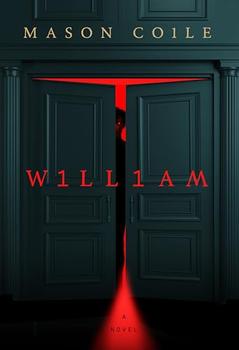
by Mason Coile
Psychological horror meets cyber noir in this delicious one-sitting read—a haunted house story in which the haunting is by AI.
Henry is a brilliant engineer who, after untold hours spent in his home lab, has achieved the breakthrough of his career—he's created an artificially intelligent consciousness. He calls the half-formed robot William.
No one knows about William. Henry's agoraphobia keeps him inside the house, and his fixation on his project keeps him up in the attic, away from everyone, including his pregnant wife, Lily.
When Lily's coworkers show up, wanting to finally meet Henry and see the new house—the smartest of smart homes—Henry decides to introduce them to William, and things go from strange to much worse. Soon Henry and Lily discover the security upgrades intended to keep danger out of the house are even better at locking it in.
"Moments of this cinematic tale truly terrify…Coile maximizes his premise's inherent tension using nightmare imagery and an uneasy third-person-present narration shot through with powerlessness, paranoia, and dread. Gleefully lurid fun." —Kirkus Reviews
"A smart home turns into a house of horrors in this suspenseful outing from Coile… Coile expertly imagines the sort of ghoulish snares a cybernetic environment could spring upon its unprepared captives and throws in a late-inning explanation for the source of William's apparent sociopathy that is as believable as it is chilling. It's a frightening Frankenstein fable for the age of AI." —Publishers Weekly
"A wickedly fast cyber-thriller. Much of the action consists of William's prisoners either dying horribly or testing their confines, a scenario that hearkens back to the trope where technology grows smarter and therefore more sinister. A late-act reveal helps this story stand out among other technology-going-bad tales, and those who like the trope, or enjoy a good techno-thriller, will want to watch William play with his human toys." —Library Journal
"From its first page all the way to its jaw-dropping ending, William had me hooked. I mainlined this book in one sitting, loving the tragically endearing protagonist Coile had created while marveling at the whip-smart plotting." —Nick Cutter, author of The Troop and The Deep
"William is the perfect blend of sci-fi and horror. Coile locks you in the smart home of your nightmares, and inside is a gauntlet of thrills and surprises that'll have you looking over your shoulder till the very end. If reading with one hand over your mouth is your thing, this is the book for you." —Gus Moreno, author of This Thing Between Us
"A gripping page-turner that makes you think, William gets you by the throat and doesn't let go until it has spun you through some of your darkest fears. Mason Coile has written a modern-day Frankenstein for our digital age that grapples with the notion of consciousness and what makes a human." —Araminta Hall, author of One of The Good Guys
This information about William was first featured
in "The BookBrowse Review" - BookBrowse's membership magazine, and in our weekly "Publishing This Week" newsletter. Publication information is for the USA, and (unless stated otherwise) represents the first print edition. The reviews are necessarily limited to those that were available to us ahead of publication. If you are the publisher or author and feel that they do not properly reflect the range of media opinion now available, send us a message with the mainstream reviews that you would like to see added.
Any "Author Information" displayed below reflects the author's biography at the time this particular book was published.
Mason Coile is a pseudonym of Andrew Pyper, the award-winning author of ten novels, including The Demonologist, which won the International Thriller Writers Award, and Lost Girls, which was a New York Times bestseller and Notable Book of the Year. Both Coile and Pyper live in Toronto.
Your guide toexceptional books
BookBrowse seeks out and recommends the best in contemporary fiction and nonfiction—books that not only engage and entertain but also deepen our understanding of ourselves and the world around us.